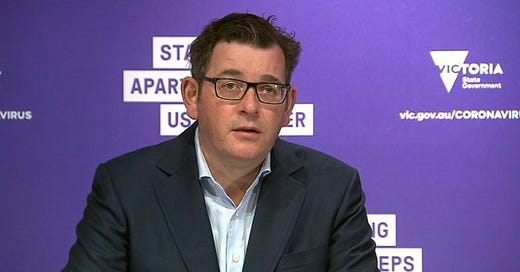COVID Lockdown: Victorian Premier May Have Lied About Curfew Advice
By Sydney Criminal Lawyers
Both the Victorian Police Commissioner and the Victorian Chief Health Officer have embarrassed Premier Daniel Andrews by admitting on separate occasions to national media that the nightly curfews which have Melburnians locked in their homes between the hours of 8pm to 5am were not instigated by either of them.
Now many are asking the question: who decreed the nightly lockdowns, and why?
Originally, Victoria Premier Daniel Andrews told State Parliament that the Police Commissioner had told him that a nightly curfew would make it easier to police stage four restrictions.
But this appears to be incorrect, with the Police Commissioner saying he was never consulted on the issue and was only alerted to the curfew hours before it was put into place on 2 August 2020.
Melburnians continue to face another several weeks of night curfews, although from this weekend, the night curfew will be changed to start at 9pm.
Pressure to remove the curfew
With many questioning the difference an hour could possibly make in terms of ‘stopping the spread of the virus’, Victoria’s Chief Health Officer Professor Brett Sutton has also admitted that the curfew was not his idea, although staying on Uncle Dan’s good side by saying he is not against it.
“The curfew came in as part of the state of disaster, for example, it wasn’t a state of emergency requirement,” Professor Sutton told the media.
Many believe overnight curfews are excessive and unnecessary, considering that under Stage 4 restrictions people in Melbourne are banned from travelling more than once per day and further than 5km to go shopping or to exercise, with very few exceptions, and must wear a face mask when in public.
But despite mounting pressure to lift the curfew, Mr Andrews is adamant it will remain in place until 26 October 2020.
Covid-19 fines exceed $1 million in Victoria
According to data released last month, the curfew has also been a steady revenue earner for the state, with dozens of people fined for being out of home after 8pm, including a man who was involved in a serious incident with Police who shot through his car window.
In one night alone, shortly after the curfew was introduced, police issued 43 fines. So far, Victoria has collected a total of more than $1 million in fines for Covid-19 public health breaches.
Federal Government intervention
In the meantime, the Federal Health Minister Greg Hunt has urged Daniel Andrews to lift the curfew, considering that it is not based on health advice, and has also asked the government to be transparent about its virus modelling.
Whether his federal standing will actually make a difference is difficult to determine.
Earlier this week, Prime Minister Scott Morrison found himself accused by Queensland Premier Annastacia Palaszczuk of bullying when he intervened in the case of a woman from the ACT who had been refused permission from Queensland Health Authorities to attend her father’s funeral. At the same time, a family with four children had been told that only one child could visit their dying father in a Brisbane Hospital.
While the funeral issue was eventually resolved and the family has since been allowed to visit, under strict conditions, there have been other reports of the harsh impact of the strict Queensland border closures on people in Northern New South Wales, with some being denied access to medical care, and many families separated because of work and other commitments.
The fact remains that at some point the state governments have got to put sensible measures in place to deal with Covid-19.
Medical experts have been saying for a long time that we will have to learn to ‘live with’ the coronavirus for many months to come, which means that governments should be considering ways to isolate, contain and manage virus outbreaks, rather than simply revert to severe laws lockdowns which are not only beginning to take a toll on people’s mental and emotional wellbeing, but have all but brought the economy to a standstill.
This is a very real and complex issue that needs to be addressed so that Australia can start to move forward, and give people back their basic democratic freedoms and safeguards.





